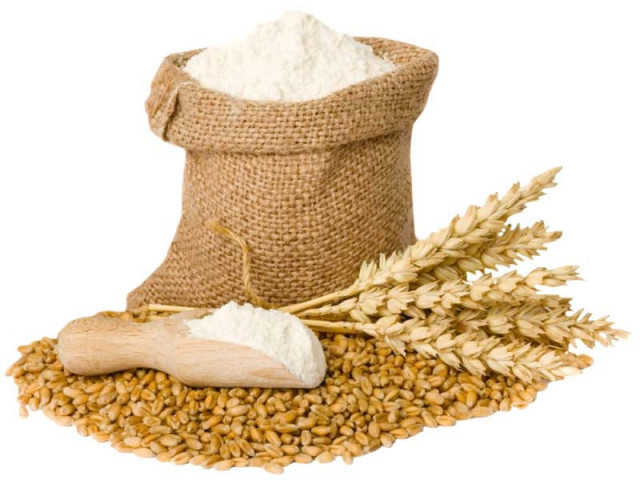ECC defers decision on wheat support price hike
Delay due to differences over required increase in light of double-digit inflation

Wheat and flour prices have dramatically increased in recent months and there are apprehensions that any further hike in the support price may keep the key inflation index in double digits for a longer period. PHOTO: FILE
The Economic Coordination Committee (ECC) of the cabinet did not take a decision on a further increase in the wheat support price. A day earlier, the federal cabinet had referred back to the ECC’s earlier decision to increase the price by Rs50 to Rs1,350 per 40 kg.
Representatives of the farmers’ community have termed the proposed increase insignificant due to high inflation and an increase in their cost of production. The cost of production has risen to Rs1,349.57 per 40 kg in Punjab and Rs1,315.72 per 40 kg in Sindh, which has made it difficult for the farmers to make both ends meet. The ECC would today (Thursday) again take up the matter of whether to fix the new price at Rs1,350 or Rs1,400 per 40 kg, said a senior official of the Ministry of National Food Security and Research.
Despite price rise, wheat farmers get no incentive
World wheat prices are around Rs1,450 per 40 kg excluding import duties. Wheat and flour prices in Pakistan have dramatically increased in recent months and there are apprehensions that any further hike in the support price may keep the key inflation index in double digits for a longer period.
Wheat stocks are reported at the level of 6.444 million tons compared to 10.093 million tons at the same time last year.
The ECC approved amendments to a host of rules governing the regulation of upstream petroleum sector to foster ease of doing business and encourage investment in the sector.
It endorsed amendments to nearly 18 rules dealing with approvals, extensions, renewals, revocations and other ancillary matters covered under the Pakistan Onshore Petroleum (Exploration and Production) Rules 2013, and their subsequent incorporation into relevant rules governing the regulation of the upstream petroleum sector.
Earlier, the ECC was told by the Ministry of Energy that a careful review of the Pakistan Onshore Petroleum (Exploration and Production) Rules 2013, undertaken in consultation with the petroleum industry, revealed that the rules were unduly stringent and had never been objectively updated to capture the latest regulatory and best business practices with a progressive approach to regulate the energy sector and encourage investment in the sector.
According to the ECC decision, the amendments would be notified after formal vetting by the Law Division and would become applicable to the new as well as existing licences and leases. Holders of such leases would be allowed to adopt the changes through the signing of supplemental agreements to the petroleum concession agreement (PCA) or any other instrument to be finalised in consultation with the Law and Justice Division.
The ECC also approved incorporation of similar amendments into the Pakistan Petroleum (Production) Rules 1949, Pakistan Petroleum (Exploration and Production) Rules 1986, Pakistan Petroleum (Exploration and Production) Rules 2001 and Pakistan Onshore Petroleum (Exploration and Production) Rules 2009, which would be notified after formal vetting by the Law and Justice Division.
After the said rules have been repealed, a legally tenable way forward would also be worked out in consultation with the Law and Justice Division. The ECC approved a technical supplementary grant of Rs30 billion for the redemption of bonds issued by the Federal Board of Revenue’s (FBR) Refund Settlement Company Limited and payment of sales tax refunds by the FBR in the form of cheques in accordance with the prescribed rules.
The ECC also considered another proposal from the Ministry of Information Technology for the extension of a sovereign guarantee in respect of Telephone Industries of Pakistan (TIP) for a further period of two years till September 15, 2021.
The ministry also sought payment of loans amounting to Rs2.1 billion, inclusive of the mark-up of Rs1.030 billion, for smooth processing of the TIP revival plan.
However, ECC Chairman Dr Abdul Hafeez Shaikh voiced his reservations about the proposal. Power Minister Omar Ayub pressed hard to get the proposal approved, saying it was critical to run TIP and sustain the vote bank of Pakistan Tehreek-e-Insaf (PTI) in Haripur district.
Govt to provide Rs16b subsidy on wheat cultivation
The ECC discussed the proposal in detail and constituted a seven-member high-level committee, headed by Adviser to Prime Minister on Commerce, Textile, Industry and Production Abdul Razak Dawood, to review the proposal and submit its recommendations to the ECC within two weeks, according to a finance ministry statement.
On another proposal by the Ministry of Information Technology for exemption from 8% minimum income tax for National Telecommunication Corporation, the ECC constituted a body comprising Minister for Economic Affairs Hammad Azhar, representatives of the Board of Investment and the FBR, which would review the proposal and present suitable recommendations to the ECC.
The ECC approved a proposal of the Commerce Division for declaring the erstwhile zero-rated sectors namely textile (including jute), carpet, leather, sports and surgical goods as export-oriented sectors. The move will help release budgetary subsidies for these sectors.
Published in The Express Tribune, November 28th, 2019.
Like Business on Facebook, follow @TribuneBiz on Twitter to stay informed and join in the conversation.



















COMMENTS
Comments are moderated and generally will be posted if they are on-topic and not abusive.
For more information, please see our Comments FAQ